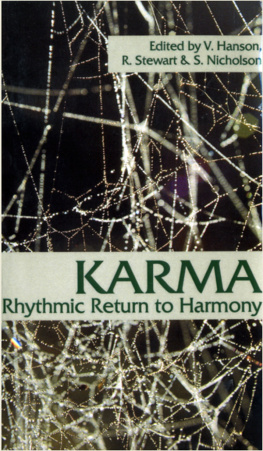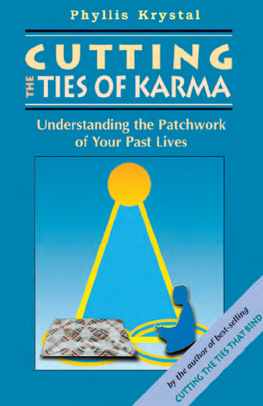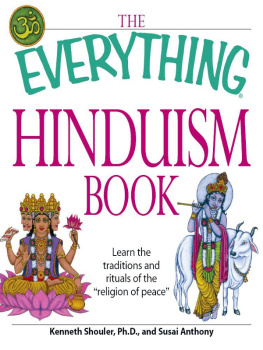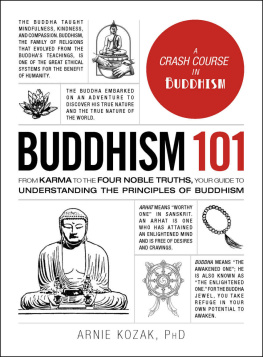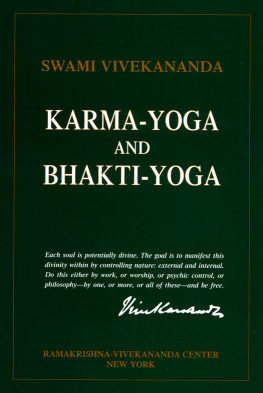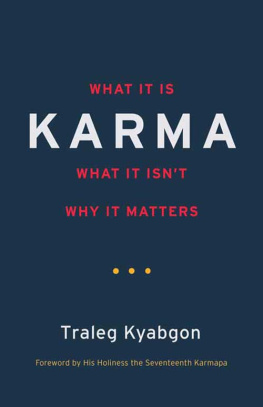
KARMA
Rhythmic Return to Harmony
Cover design by Carol W. Wells
COVER PHOTO BY MOLLY DEAN
KARMA
Rhythmic Return to Harmony
Edited by V. Hanson, R. Stewart & S. Nicholson
A publication supported by
THE KERN FOUNDATION

Learn more about Shirley Nicholson and her work at www.questbooks.net
Copyright 1975, 1981, 1990 by the Theosophical Publishing House Third Quest Edition 1990
Quest Books
Theosophical Publishing House
PO Box 270
Wheaton, IL 601870270
Without limiting the rights under copyright reserved above, no part of this publication may be reproduced, stored in or introduced into a retrieval system, or transmitted, in any form, or by any means (electronic, mechanical, photocopying, recording, or otherwise), without the prior written permission of the publisher of this book.
The scanning, uploading, and distribution of this book via the Internet or via any other means without the permission of the publisher is illegal and punishable by law. Please purchase only authorized electronic editions, and do not participate in or encourage electronic piracy of copyrighted materials.
While the author has made every effort to provide accurate telephone numbers and Internet addresses at the time of publication, neither the publisher nor the author assumes any responsibility for errors or for changes that occur after publication. Further, the publisher does not have any control over and does not assume any responsibility for author or third-party websites or their content.
Library of Congress Cataloging-in-Publication Data
Karma, rhythmic return to harmony / edited by Virginia Hanson,
Shirley Nicholson, Rosemarie Steward.3rd ed.
p. cm.
Rev. and enl. ed. of: Karma, the universal law of harmony. 1981.
Includes bibliographical references.
ISBN 9780835606639
1. Karma. I. Hanson, Virginia. II. Nicholson, Shirley J. III. Stewart, Rosemarie. IV. Title: Karma, the universal law of harmony.
BP573.K3K37 1990
ISBN for electronic edition, e-pub format: 9700835621441
A stone falls into the water and creates disturbing waves. These waves oscillate backward and forward till at lastthe water returns to its condition of calm tranquility. Similarly all action, on every plane, produces disturbance in the balanced harmony of the universe, and the vibrations so produced will continue to roll backward and forwardtill equilibrium is restored.
H.P. Blavatsky
Contents
Karma in Motion
Felix Layton |
Karma as Organic Process
Shirley Nicholson |
Compensation
Ralph Waldo Emerson |
Karma and Reincarnation
L. H. Leslie-Smith |
God Is Not Mocked
Aldous Huxley |
The Source of Becauses
Clarence Pedersen |
A Buddhist View of Karma
Joseph Goldstein |
Karma, the Link Between Lives
Ananda Coomaraswamy |
The Meaning of Karma in Integral Philosophy
Haridas Chaudhuri |
The Christening of Karma
Geddes MacGregor |
A Kabbalistic View of Karma
Edward Hoffman |
Karma, Jung, and Transpersonal Psychology
Harold Coward |
Psychic Scars
Roger J. Woolger |
Karma and the Birth-Chart
Stephen Arroyo |
The Ancient Shape of Fate
Liz Greene |
Karma Re-Examined: Do We Ever Suffer Undeservedly?
Diana Dunningham Chapotin |
Choosing: Karma and Dharma in the 21st Century
William Metzger |
Karmic Process in Science and Society
Anna Freifeld Lemkow |
Can We Avoid Karmic Debts?
Alfred Taylor |
The Side Blows of Karma
George E. Linton |
The Transmutation of Karma into Dharma
Dane Rudhyar |
The Other Face of Karma
Virginia Hanson |
Karma and the Path of Purification
Christopher Chapple |
Karma, the Chakras and Esoteric Yoga
Ray Grasse |
Karma and Cosmos
Laurence J. Bendit |
Preface
In 1975 when Quest Books first published an anthology on karma, the concept was already becoming familiar in mainstream America. Introduced in the mid-1800s by Emerson and others who were studying Eastern thought, it was expounded in great detail in the late 1800s by H. P. Blavatsky, one of the founders of the Theosophical Society and author of the volumes of The Secret Doctrine, a major source book of modern esoteric studies. Those in the Theosophical movement and similar groups for long were the main custodians of ideas of the Ancient Wisdom such as karma.
Today the picture has changed. The word karma shows up in films, comic strips, conversations among ordinary people. Eastern and Western scholars, psychologists, astrologers, health practitioners, even students of society and economy have written about karma. This kind of literature had begun to appear in 1981 when the second and expanded edition of the Quest anthology came out By now there is a wealth of material on the subject of karma that has originated outside of esoteric circles. The term is even included in English dictionaries.
The present volume includes fourteen articles that were not in the earlier editions, by such authors as Joseph Goldstein and Ananda Coomaraswamy, who write from the Buddhist position, Christopher Chapple, scholar who specializes in yoga philosophy, Alfred Taylor, research scientist, Liz Greene and Stephen Arroyo, psychologist/ astrologers, Roger Woolger and Harold Coward, Jungians.
Obviously, many points of view are covered, but they all contain, either explicitly or implicitly, the concept of karma as the harmonizer that restores balance, as the facilitator of a rhythmic return to harmony. As Joy Mills said in the foreword to the earlier editions:
The Sanskrit term, karma, has been adopted in English dictionaries as the all-embracing term for that universal law, the harmonic law of adjustment, of compensation, action-reaction, to which all natural processes are subject The ramifications of the law must be endless and complex as those processes; yet in its ultimate simplicity, the law is harmony, the perfect relationship which obtains between all things everywhere.
It has become increasingly clear in recent years that we live in an interconnected, holistic universe in which all things everywhere are interdependent In this context it is more evident than it was in the nineteenth century, when karma was introduced in the West, that past and future are connected, that events flow in the Whole where movement at any level of life affects all other levels. This current view of holism, which is held by many scientists, ecologists, philosophers, as well as esotericists, can easily accommodate the concept of karma. In the words of Prem and Ashish, who wrote from the point of view of The Secret Doctrine, (Man, the Measure of All Things, p. 210):
Particular events take placebecause of an organic linking of the whole of cosmic experience, a linkage which is such that all events in the Cosmos are bound together in one harmonious correlation.
Next page
